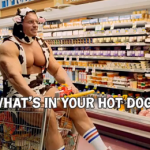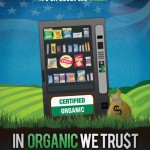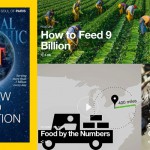Applegate’s Cleaner Wiener ad campaign is a creative narrative on protein production
Very funny, very creative and very true – Parents should watch these 30 second spots before you buy your next dog:
——————————
Preservatives and synthetic nitrates:
——————————
Growth Hormones & antibiotics:
Best American Cities for Foodies – NYC, Boston, Portland ME
Conde Nast Readers’ Choice Survey explores the best US cities for foodies. With Newport RI, Portland ME and Boston MA all following top rated NYC – the Northeast has 4 of the top 20 locations for best restaurants and eateries. Besides California hosting ½ of the total winners, the Northeast is clearly a thought-leader in food – despite minuscule local production.
NEW MOVIE explores the influence of industrial farming on Organic production
– – – – –
After recent Soil-to-Table articles re: Walmart’s commitment to Organic foods, Whole Foods growing presence, and general consumer awareness that the only alternative to conventional production is USDA Organic (fka industrialized Organics) – a few of our readers suggested I share a link to this newly released movie on Netflix and Amazon Instant: In Organic we Trust.
“In Organic We Trust” is an eye-opening food documentary that looks beyond organic for practical solutions for me (from the director) and you. Local farmer’s markets, school gardens, and urban farms are revolutionizing the way we eat. Change is happening from the soil up.
When corporations went into the business and “organic” became a brand, everything changed. The philosophy and the label grew apart. Can gummy bears or bananas flown halfway across the world truly be organic?
From the S2T mailing curator: Believing broader adoption of Organic food is an essential next step for the masses to think more about their sustenance, I think less synthetics & pesticides, no GMOs, no growth hormones & antibiotics in proteins and so much more that are built into Organic – local or industrial – is nothing but a good next step. I agree with this movie – the only future of food production is via regional sustainable agriculture, but as learned with alternative energy production, we must have a better strategy, a better plan to enact change with scale or we’ll further set back all better food initiatives.
National Geographic – multi-part series: NEW FOOD REVOLUTION
– – – –
When we think about threats to the environment, we tend to picture cars and smokestacks, not dinner. But the truth is, our need for food poses one of the biggest dangers to the planet.
Agriculture is among the greatest contributors to global warming, emitting more greenhouse gases than all our cars, trucks, trains, and airplanes combined—largely from methane released by cattle and rice farms, nitrous oxide from fertilized fields, and carbon dioxide from the cutting of rain forests to grow crops or raise livestock. Farming is the thirstiest user of our precious water supplies and a major polluter, as runoff from fertilizers and manure disrupts fragile lakes, rivers, and coastal ecosystems across the globe. Agriculture also accelerates the loss of biodiversity. As we’ve cleared areas of grassland and forest for farms, we’ve lost crucial habitat, making agriculture a major driver of wildlife extinction.
Jennifer Hashley discusses NESFP & being a new mom on Growing Business
Through New Entry Sustainable Farming project & Pete & Jen’s Backyard birds, Jennifer Hashley is a house-hold name in regional sustainable farming. New Entry helps farmers, starting with the business side of farming. The first year is all about business planning. Jen helps prospective farmers create a business plan, a marketing plan, a food safety plan, assess risk management, and even helps to match them up with farmland. Their goal is to help new farmers excel in the field, and New Entry gives them the tools to do that. They are a great resource for anyone looking to get into the field.
According to Hashley, the sustainable food movement needs to start with the consumers and then the companies will follow. It happens one bite at a time. We need to teach people more about where food comes from and start labeling our products better. Buying more locally and less processed foods is a good investment for you and your health.
May 11 -‘Years of Living Dangerously’ is free on Showtime
This groundbreaking documentary event series explores the human impact of climate change. From the damage wrought by Hurricane Sandy to the upheaval caused by drought in the Middle East, YEARS OF LIVING DANGEROUSLY combines the blockbuster storytelling styles of top Hollywood movie makers with the reporting expertise of Hollywood’s brightest stars and today’s most respected journalists.
DID-U-KNOW: Congresswoman Kuster – first NH rep on House Ag committee in 70 years
—
The programs authorized by this (farm) bill are essential to supporting our farmers and agricultural producers, providing nutrition assistance to families in need, and protecting our environment. But instead of providing unnecessary direct payments to big agribusiness, the Farm Bill should support programs that help our local and organic farmers, expand farm-to-school initiatives, and strengthen the safety net for growers of fresh fruit, vegetables, and other specialty crops.
Pushing to foster local/regional food focused on quality, safety & sustenance – this mom and granite stater is making good things happen. More on Annie McLane Kuster: http://1.usa.gov/1g67mgU
Rodale: Organic farming can reverse climate change
Rodale Institute announced the launch of a global campaign to generate public awareness of soil’s ability to reverse climate change, but only when the health of the soil is maintained through organic regenerative agriculture. The campaign will call for the restructuring of our global food system with the goal of reversing climate change through photosynthesis and biology.
The white paper states that “We could sequester more than 100% of current annual CO2 emissions with a switch to widely available and inexpensive organic management practices, which we term “regenerative organic agriculture.” If management of all current cropland shifted to reflect the regenerative model as practiced at the research sites included in the white paper, more than 40% of annual emissions could potentially be captured. If, at the same time, all global pasture was managed to a regenerative model, an additional 71% could be sequestered. Essentially, passing the 100% mark means a drawing down of excess greenhouse gases, resulting in the reversal of the greenhouse effect.
Glyphosate herbicide (Roundup) found in US mother’s milk
– – – – – – –
At level up to 1600 times higher than allowed in European drinking water, a new study has found Glyphosate has been found in mother’s milk, urine and in 70% of US drinking water.
Glyphosate-containing herbicides are the top-selling herbicides in the world and are sold under trademarks such as Monsanto’s ‘Roundup’. Monsanto’s sales of Roundup jumped 73 percent to $371 million in 2013 because of its increasing use on genetically engineered crops (GE Crops).
Full Report: http://bit.ly/1uM0VTZ













